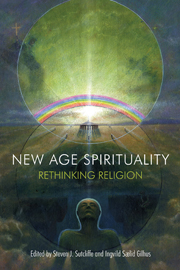Book contents
- Frontmatter
- Contents
- Introduction: “All mixed up” – thinking about religion in relation to New Age spiritualities
- Part I Rethinking New Age spiritualities
- 1 New Age, world religions and elementary forms
- 2 “All over the place”: the contribution of New Age to a spatial model of religion
- 3 Towards a new paradigm of constructing “religion”: New Age data and unbounded categories
- 4 On transgressing the secular: spiritualities of life, idealism, vitalism
- 5 Hiding in plain sight: the organizational forms of “unorganized religion”
- Part II Comparing New Age beliefs and practices
- Part III Putting new spiritual practices to work
- Conclusion: New Age spiritualities – “good to think” in the study of religion
- Contributors
- Further reading
- Bibliography
- Index
1 - New Age, world religions and elementary forms
from Part I - Rethinking New Age spiritualities
- Frontmatter
- Contents
- Introduction: “All mixed up” – thinking about religion in relation to New Age spiritualities
- Part I Rethinking New Age spiritualities
- 1 New Age, world religions and elementary forms
- 2 “All over the place”: the contribution of New Age to a spatial model of religion
- 3 Towards a new paradigm of constructing “religion”: New Age data and unbounded categories
- 4 On transgressing the secular: spiritualities of life, idealism, vitalism
- 5 Hiding in plain sight: the organizational forms of “unorganized religion”
- Part II Comparing New Age beliefs and practices
- Part III Putting new spiritual practices to work
- Conclusion: New Age spiritualities – “good to think” in the study of religion
- Contributors
- Further reading
- Bibliography
- Index
Summary
NEW AGE: AN UNRULY OBJECT?
This chapter argues that recurring uncertainties in demarcating “new age” phenomena are in important respects an effect of conceptual constraints upon our thinking about “religion” in general. These constraints are imposed by the existing taxonomy of religious formations, which is derived from the prototype of a “world religion”! The apparent broadening of this taxonomy from the early 1970s on, through the use of adjunct terms like “new religion” and “new religious movement”, while appearing to differentiate and pluralize representations of religious formations, in fact left the basic prototype undisturbed and even strengthened. Under its terms, the popular practices and beliefs which circulate under the name “new age” (and related modern rubrics such as “holistic”) can only register on the conceptual radar of religion as an anomalous or residual category. The often-remarked problem of defining new age is therefore better understood not as an empirical question – we now know a fair amount about the varieties of beliefs and practices in circulation – but as a fresh and pressing example of how our concepts (continue to) construct our data. The world religions paradigm is a recognized conceptual problem in the study of South Asian traditions, especially in relation to “Hinduism” (Fitzgerald 1990; Geaves 2005). “New Age” phenomena raise similar questions, but now in relation to the construction of religion in a “Western” context.
- Type
- Chapter
- Information
- New Age SpiritualityRethinking Religion, pp. 17 - 34Publisher: Acumen PublishingPrint publication year: 2013



